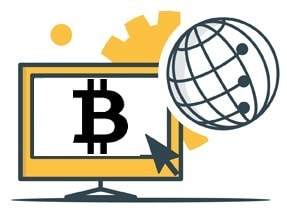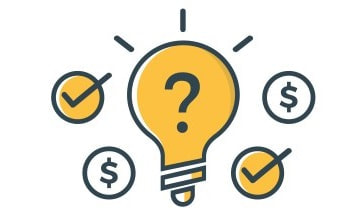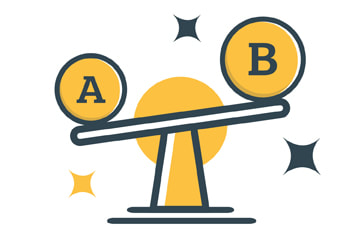The Definitive Guide to Bitcoin in New Zealand
This Bitcoin guide covers all aspects of this modern currency/asset (it’s still undecided), the pros, cons, risks and must-know facts. Disclaimer - by publishing this guide, we are NOT recommending you buy Bitcoin - this guide is for informational purposes only.
Updated 18 July 2024
As the price of Bitcoin continues to move up and down, it can be awfully tempting to invest. Bitcoin is a controversial subject. It’s hard to get unbiased information about it anywhere. Advocates, usually people invested in Bitcoin, often overstate the benefits and ignore the risks. At the same time, sceptics like governments and financial services regulators criticise and dismiss Bitcoin as nothing more than a bubble, Ponzi scheme or utility for money laundering.
As interest in Bitcoin grows daily, not just in New Zealand but worldwide, we’ve decided to prepare a guide dedicated to explaining what Bitcoin is so you can at least have an understanding before jumping in at the deep end.
Warning:
Summary
Our guide covers:
As interest in Bitcoin grows daily, not just in New Zealand but worldwide, we’ve decided to prepare a guide dedicated to explaining what Bitcoin is so you can at least have an understanding before jumping in at the deep end.
Warning:
- By publishing this guide, we are not recommending or suggesting in any way or form that Bitcoin is a suitable investment.
- We published and routinely update this guide to help people decide what's best for them - MoneyHub is conservative on matters concerning personal finance. Our publisher, Christopher Walsh, has zero Bitcoin investments.
- We present this information in good faith and remain objective at all times. By including this guide under our Investing and Saving section, we are not advocating that cryptocurrency is an investment or a stable long term savings product.
- We may earn a referral bonus for anyone that clicks on some of the below links - see our Advertising Policy for more details.
Summary
- Bitcoin, as we know it, came to fruition in 2009. The first transaction was processed on the 3rd of January 2009.
- Bitcoin was the first cryptocurrency in production, but the theory has been around since 1983. Several cryptography experts have published papers for similar decentralised cryptography-based currencies.
- To this day, no one is sure who created Bitcoin. Although several people have claimed their involvement, none of them has provided convincing evidence.
- Bitcoin is a decentralised, finite, trustless, peer-to-peer, digital currency; we’ll explain those buzz words further into this guide.
- Many people do not distinguish the difference between Bitcoin as a speculative asset and a payment instrument.
- The Bitcoin price is highly volatile. Investments that appreciate very quickly can also depreciate just as quick.
- Many wallet apps and exchanges make it quick and straightforward to buy and hold Bitcoin. However, the underlying technology is rather complex, and hackers can exploit inexperienced exchanges or wallets, putting your coins at risk of theft.
- Although we do not endorse Bitcoin, the philosophical and innovation principles are fascinating and worth knowing. We also respect that many Kiwis will be interested in having a punt or weighing the pros and cons and decided to begin investing in Bitcoin.
Our guide covers:
Overview of Bitcoin
Bitcoin is a peer-to-peer electronic cash network allowing individuals to transact without the involvement of a financial institution mediating, processing and settling payments. Many advocates say Bitcoin allows you to be your own bank, but frankly, it is so revolutionary, there aren’t many reliable analogies to describe Bitcoin.
Here are some of the fundamental features of Bitcoin:
Blockchain
Wallet
Private key
Public key
Address
Signature
Here are some of the fundamental features of Bitcoin:
Blockchain
- A blockchain is a type of database or ledger with unique characteristics that protects it from manipulation. A regular database can be likened to a complex spreadsheet with columns and rows.
- A blockchain is more like a series of individual files that reference the previous file. As each new block is linked to the previous block, it forms a chain, hence the name blockchain. One of the features making blockchain secure is the concept that a transaction is confirmed each time a new block is processed.
- Consider a centralised database, such as what a bank would use. If you want to delete a transaction, you only need to compromise one system and edit a single data entry. However, to manipulate a blockchain transaction, you’d need to edit the block where the transaction first appeared and all subsequent blocks.
Wallet
- A Bitcoin wallet is an abstract concept, and the description varies. Essentially, a Bitcoin wallet is a public key and private key pair used to verify ownership and initiate transactions.
- The definition has been hijacked by wallet applications like Coinbase that provide a service to host the keys online and initiate transactions. The original Bitcoin wallet is known as Bitcoin Core, When you hear the phrase wallet, it generally means a method of managing your Bitcoin, but the characteristics have significance. A Bitcoin wallet can simply be a piece of paper with your private key written down.
Private key
- A private key is a key to unlocking Bitcoins. All other features of a Bitcoin wallet derive from the private key. The public key is derived from the private key, and addresses are derived from the public key.
- Without a private key, Bitcoins are lost forever. If a private key falls into the wrong hands, coins can be stolen, and all blockchain transactions are non-reversible. Hence why so much importance is put towards protecting private keys.
Public key
- A public key originates from the private key, but the private key cannot be inferred from the public key.
- Collectively, the public key and private key are used to authenticate transactions.
Address
- A Bitcoin address is an identifier of between 26 and 35 letters and numbers. Bitcoin addresses are aliases of public keys. One public key can generate unlimited addresses, and it’s encouraged to use a new address for each payment you want to receive, particularly in an eCommerce situation.
- A Bitcoin address can be considered as a bank account number and transaction referenced combined.
Signature
- Every Bitcoin transaction is signed with a signature and can only be created using the private key and public key together. Signatures are basically an authorisation message containing details of the transaction. It’s created using cryptography, allowing one to be created offline, ensuring the private key isn’t exposed. The public key and signature collectively prove whoever created it had access to the public key.
How does Bitcoin work?
For Bitcoin to function without intermediaries, it depends on sophisticated cryptography and hardcoded rules supported by an army of miners with powerful computing resources to process transactions and a decentralised network of thousands of nodes to verify transactions and maintain a complete transaction history using a blockchain. All of these factors make it difficult to compromise the Bitcoin network itself.
Key Characteristics of Bitcoin - Advantages and Disadvantages
Bitcoin was born while the dust from the 2008 financial crisis was still settling. The Bitcoin white paper identifies several inherent flaws in legacy fiat-based monetary systems. The Bitcoin network presents numerous advantages, but many of them come with trade-offs.
Advantages of Bitcoin:
1. Bitcoin is decentralised
Bitcoin is a decentralised payment instrument. There is no central authority participating in transactions, allowing Bitcoin to be truly peer-to-peer, in a similar way to cash. You don't need to ask permission to create a Bitcoin address or send BTC to anyone anywhere in the world. It's technically impossible for a government to seize your funds, as it could do to your money in a bank account. These characteristics are what makes Bitcoin a self-sovereign currency.
The drawback of Bitcoin's decentralised characteristic is the ability for criminals and terrorists to leverage the cryptocurrency for laundering money.
2. Bitcoin transactions are final
Because no intermediary is participating in Bitcoin transactions, all payments are final. Because of this, there is no counterparty risk for the recipient. For the sender, it means, if you send money to the wrong person, you can't recall the transaction. If a supplier doesn't deliver the agreed goods or services, you can't log a chargeback request with your card provider.
3. Bitcoin relies on strong cryptography
Bitcoin uses an asymmetric cryptography system. The only way to verify ownership of Bitcoin is by knowing the public and private key combination. Naturally, the public key is not hard to discover as it's public. However, anyone using Bitcoin must keep the private key stored securely and secretly. Conducting a brute-force attack to try and guess the private key of one wallet would be impossible with today's technology. Theoretically, even giving it a go would cost billions of dollars, making it unviable.
4. There is a finite supply of Bitcoin
There will only ever be 21 million Bitcoins, and that limit will be reached in 2140, more than 100 years from today. Whereas there is no limit on how many NZD can be created by the Reserve Bank of New Zealand. Currently, the M1 money supply is NZ$114.7b, whereas it was just over NZ$90b a mere 12 months ago and below NZ$50b 5 years ago.
The downside of Bitcoins scarcity is that it became an asset rather than a payment instrument, causing the price to increase significantly. The volatility of BTC hinders the cryptocurrency from becoming a medium of exchange.
5. Bitcoin is private but not anonymous
Many people believe Bitcoin is an anonymous payment network. Actually, Bitcoin is pseudonymous. Every Bitcoin user has an address, and all incoming and outgoing transactions are recorded on the blockchain for all to see. Once the address is associated with an identity, all transactions can be linked to that person.
For example, this Bitcoin address (34xp4vRoCGJym3xR7yCVPFHoCNxv4Twseo) belongs to Binance, where we can see the wallet contains more than 169 million BTC, equivalent to NZ$13.1 billion.
6. You can customise Bitcoin transaction fees
When making a Bitcoin transaction, you set the network fee you're willing to pay. You could even choose to pay nothing at all. Miners are already rewarded 6.25 BTC for each block of transaction they process, but transaction fees are an additional stream of income for miners. Only a certain amount of transactions can fit into a block, and miners can prioritise which transactions to process first based on the network fee.
When a backlog of transactions occurs, spenders begin outbidding each other to ensure their transaction will be processed. On the 17th of April 2021, the average network fee per transaction paid to miners was NZ$72.70, representing a 1.35% transaction fee. Although you can set your fees on BTC transactions, the unregulated nature of the network means participants compete for priority.
On the 20th of October 2018, Binance moved the equivalent of NZ$1.94 billion in Bitcoin and paid just NZ$191.70 fees. We can only imagine the fees and paperwork involved in transferring that much money through a bank.
Disadvantages of Bitcoin:
1. Risk of permanent loss
If you lose your private key and the backup seed, any Bitcoins you had will be lost forever. Unlike your online banking or any other e-wallet you have, there is no one to verify you're the true owner of the funds and reset your password. It's estimated that 20% of all Bitcoins are lost.
2. Regulation and banking limitations
Banks remain very sceptical of Bitcoin and cryptocurrencies in general. Some believe the friction they apply to the industry stems from fear of competition. While that could be partially true, there are valid concerns about money laundering and fraud risk. It's not unusual to have payments to Bitcoin-related companies, such as exchanges, questioned by your bank.
3. Energy consumption
As the number of Bitcoin users and the number of transactions grew, so did the demand for computing resources to support the network. Due to the complex cryptographic equations needed to be solved, high-performance equipment is required, which consumes a significant amount of energy.
Advantages of Bitcoin:
1. Bitcoin is decentralised
Bitcoin is a decentralised payment instrument. There is no central authority participating in transactions, allowing Bitcoin to be truly peer-to-peer, in a similar way to cash. You don't need to ask permission to create a Bitcoin address or send BTC to anyone anywhere in the world. It's technically impossible for a government to seize your funds, as it could do to your money in a bank account. These characteristics are what makes Bitcoin a self-sovereign currency.
The drawback of Bitcoin's decentralised characteristic is the ability for criminals and terrorists to leverage the cryptocurrency for laundering money.
2. Bitcoin transactions are final
Because no intermediary is participating in Bitcoin transactions, all payments are final. Because of this, there is no counterparty risk for the recipient. For the sender, it means, if you send money to the wrong person, you can't recall the transaction. If a supplier doesn't deliver the agreed goods or services, you can't log a chargeback request with your card provider.
3. Bitcoin relies on strong cryptography
Bitcoin uses an asymmetric cryptography system. The only way to verify ownership of Bitcoin is by knowing the public and private key combination. Naturally, the public key is not hard to discover as it's public. However, anyone using Bitcoin must keep the private key stored securely and secretly. Conducting a brute-force attack to try and guess the private key of one wallet would be impossible with today's technology. Theoretically, even giving it a go would cost billions of dollars, making it unviable.
4. There is a finite supply of Bitcoin
There will only ever be 21 million Bitcoins, and that limit will be reached in 2140, more than 100 years from today. Whereas there is no limit on how many NZD can be created by the Reserve Bank of New Zealand. Currently, the M1 money supply is NZ$114.7b, whereas it was just over NZ$90b a mere 12 months ago and below NZ$50b 5 years ago.
The downside of Bitcoins scarcity is that it became an asset rather than a payment instrument, causing the price to increase significantly. The volatility of BTC hinders the cryptocurrency from becoming a medium of exchange.
5. Bitcoin is private but not anonymous
Many people believe Bitcoin is an anonymous payment network. Actually, Bitcoin is pseudonymous. Every Bitcoin user has an address, and all incoming and outgoing transactions are recorded on the blockchain for all to see. Once the address is associated with an identity, all transactions can be linked to that person.
For example, this Bitcoin address (34xp4vRoCGJym3xR7yCVPFHoCNxv4Twseo) belongs to Binance, where we can see the wallet contains more than 169 million BTC, equivalent to NZ$13.1 billion.
6. You can customise Bitcoin transaction fees
When making a Bitcoin transaction, you set the network fee you're willing to pay. You could even choose to pay nothing at all. Miners are already rewarded 6.25 BTC for each block of transaction they process, but transaction fees are an additional stream of income for miners. Only a certain amount of transactions can fit into a block, and miners can prioritise which transactions to process first based on the network fee.
When a backlog of transactions occurs, spenders begin outbidding each other to ensure their transaction will be processed. On the 17th of April 2021, the average network fee per transaction paid to miners was NZ$72.70, representing a 1.35% transaction fee. Although you can set your fees on BTC transactions, the unregulated nature of the network means participants compete for priority.
On the 20th of October 2018, Binance moved the equivalent of NZ$1.94 billion in Bitcoin and paid just NZ$191.70 fees. We can only imagine the fees and paperwork involved in transferring that much money through a bank.
Disadvantages of Bitcoin:
1. Risk of permanent loss
If you lose your private key and the backup seed, any Bitcoins you had will be lost forever. Unlike your online banking or any other e-wallet you have, there is no one to verify you're the true owner of the funds and reset your password. It's estimated that 20% of all Bitcoins are lost.
2. Regulation and banking limitations
Banks remain very sceptical of Bitcoin and cryptocurrencies in general. Some believe the friction they apply to the industry stems from fear of competition. While that could be partially true, there are valid concerns about money laundering and fraud risk. It's not unusual to have payments to Bitcoin-related companies, such as exchanges, questioned by your bank.
3. Energy consumption
As the number of Bitcoin users and the number of transactions grew, so did the demand for computing resources to support the network. Due to the complex cryptographic equations needed to be solved, high-performance equipment is required, which consumes a significant amount of energy.
Know This: Bitcoin adoption
- The number of Bitcoin users has grown significantly in recent years. According to the University of Cambridge Centre for Alternative Finance, in the 3rd quarter of 2020, there were 101 million verified crypto-asset user accounts.
- Popular Bitcoin wallet service blockchain.com, which doesn't require identity verification, has created more than 70 million wallets since the service launched in 2011.
- More statistics from blockchain.com highlight that in March 2021, the average number of payments per day was close to 900,000, processing a value of almost US$6.3 billion (NZ$9 billion)
- Besides individuals trading, transacting or investing in Bitcoin, businesses are getting involved. Payment platforms like BitPay make it easier for small and medium-sized businesses to accept cryptocurrencies as a payment method by accepting crypto and instantly converting to local currencies to eliminate exchange rate risk.
Getting Started with Bitcoin and Further Guides
If you've read through this guide and decided you still want to buy Bitcoin for one of several valid reasons, our exclusive MoneyHub guides explain the finer details to help you make an informed decision.
Learn more about other cryptocurrencies
This guide only covers the tip of the iceberg; there is still much more to learn about Bitcoin and cryptocurrencies in general. Consider reading our Beginner's Guide to Everything Bitcoin and Blockchain as your next move.
How to buy Bitcoin
Read our guide on how to buy Bitcoin in New Zealand to discover the ins and outs of buying your first Bitcoins or fraction of a Bitcoin. You'll also find our guide to New Zealand Bitcoin Exchanges helpful when evaluating the local options available to buy Bitcoin.
How to spend and keep your Bitcoin safe
There are various apps, services, and devices to keep your Bitcoin safe, each with distinct pros and cons. Some of the easiest ways to hold cryptocurrency, such as keeping a balance on an exchange, are the most vulnerable, whereas the most complex, such as setting up a hardware wallet, is the most secure. Read our guide on Bitcoin wallets to explore various solutions.
Best practices to avoid Bitcoin scams
Scammers are vicious in the financial sector, but they are ruthless in the cryptocurrency world. Because crypto-assets are such a novelty, and the concepts are so unfamiliar, relying on instincts just isn't enough. We will shortly publish a guide on Bitcoin scams.
Learn about Bitcoin mining
Mining is the backbone of cryptocurrencies. Bitcoin uses a proof-of-work consensus algorithm where miners compete to guess random cryptographic numbers. Although it’s an unlikely career path or even a hobby for most of our readers, the process is captivating. It can help any cryptocurrency user understand what goes on under the bonnet. Read our definitive guide to Bitcoin mining to learn about this fascinating topic.
Discover decentralised finance
Besides Bitcoin, there is a whole world of other digital assets and decentralised finance products. Everything from stablecoins, collateralised loans against Bitcoin and high-interest savings accounts. Read our decentralised finance guide to see an entire ecosystem of products evolved from Bitcoin.
A plethora of alternative cryptocurrencies and alt-coins
Besides Bitcoin, there are thousands of other cryptocurrencies, some with distinct advantages (but also disadvantages) over Bitcoin, such as Litecoin and Ethereum, and others that are nothing more than a viral joke, like Dogecoin.
Learn more about other cryptocurrencies
This guide only covers the tip of the iceberg; there is still much more to learn about Bitcoin and cryptocurrencies in general. Consider reading our Beginner's Guide to Everything Bitcoin and Blockchain as your next move.
How to buy Bitcoin
Read our guide on how to buy Bitcoin in New Zealand to discover the ins and outs of buying your first Bitcoins or fraction of a Bitcoin. You'll also find our guide to New Zealand Bitcoin Exchanges helpful when evaluating the local options available to buy Bitcoin.
How to spend and keep your Bitcoin safe
There are various apps, services, and devices to keep your Bitcoin safe, each with distinct pros and cons. Some of the easiest ways to hold cryptocurrency, such as keeping a balance on an exchange, are the most vulnerable, whereas the most complex, such as setting up a hardware wallet, is the most secure. Read our guide on Bitcoin wallets to explore various solutions.
Best practices to avoid Bitcoin scams
Scammers are vicious in the financial sector, but they are ruthless in the cryptocurrency world. Because crypto-assets are such a novelty, and the concepts are so unfamiliar, relying on instincts just isn't enough. We will shortly publish a guide on Bitcoin scams.
Learn about Bitcoin mining
Mining is the backbone of cryptocurrencies. Bitcoin uses a proof-of-work consensus algorithm where miners compete to guess random cryptographic numbers. Although it’s an unlikely career path or even a hobby for most of our readers, the process is captivating. It can help any cryptocurrency user understand what goes on under the bonnet. Read our definitive guide to Bitcoin mining to learn about this fascinating topic.
Discover decentralised finance
Besides Bitcoin, there is a whole world of other digital assets and decentralised finance products. Everything from stablecoins, collateralised loans against Bitcoin and high-interest savings accounts. Read our decentralised finance guide to see an entire ecosystem of products evolved from Bitcoin.
A plethora of alternative cryptocurrencies and alt-coins
Besides Bitcoin, there are thousands of other cryptocurrencies, some with distinct advantages (but also disadvantages) over Bitcoin, such as Litecoin and Ethereum, and others that are nothing more than a viral joke, like Dogecoin.
Frequently Asked Questions
Bitcoin isn't complicated but it is inherently risky and few New Zealanders fully understand its nature. We answer popular queries below to help explain Bitcoin in more detail.
Is Bitcoin legal in New Zealand?
Yes. It is legal to buy, own, transact and sell Bitcoin in New Zealand. The sector is unregulated but not illegal. Meaning, if you’re engaging with a company offering Bitcoin investment products, be aware that those companies are probably not subject to oversight from the Financial Markets Authority and may not be a member of an independent resolution scheme.
Does New Zealand tax Bitcoin?
Whether you pay tax on Bitcoin transactions or profits depends on the context. As New Zealand does not tax capital gains, the intent of a transaction determines whether someone should pay income tax. In most cases, it’s easier to argue that tax should be paid on income as most people buy cryptocurrencies, intending to sell them at a higher price in the future. The Inland Revenue Department has written a detailed guide concerning taxes on crypto assets.
Is Bitcoin a store of value?
No. Bitcoin is not a store of value. The price is highly volatile. Anyone claiming Bitcoin is a store of value does not understand the first thing about financial markets. At the start of 2021, a spokesperson for the New Zealand Financial Markets Authority issued a warning about Bitcoin’s price volatility. (Former) Finance minister Steven Joyce relaid that message to the NZ Herald.
Who invented Bitcoin?
After more than a decade, no one knows who created Bitcoin. The creator, who may be an individual or a group, went by the alias Satoshi Nakamoto. There are many theories and claims, but none have proven it by transferring the first Bitcoins ever mined. The blockchain analytics provider Whale Alert estimates that the anonymous figure owns 1,125,150 BTC, worth more than NZ$87.3b.
Can I use a Bitcoin ATM in New Zealand?
Unfortunately no. There was an attempt to introduce Bitcoin ATMs in New Zealand in 2014. The first and only BTC ATM launched on the 3rd of June 2014 and only survived a few weeks before it had to shut down. According to a Coin ATM Radar, there are several ATMs around New Zealand.
If Bitcoin is so secure, why do I keep hearing about hacks?
Compromising the Bitcoin infrastructure is improbable but not impossible. For now, any methods of hacking the Bitcoin core or brute-force guessing a public-private key combination are theoretical. When you hear about Bitcoin attacks in the news, these are situations where exchanges, or online wallet services, which essentially act as custodians of the coins or keys, have been compromised. If an exchange stores the private key online, and that server is hacked, the hacker has the private key and may use it to spend the Bitcoin exactly how the system was designed.
Can I invest in Crypto via KiwiSaver?
Yes, a select few schemes offer the opportunity to do so. One scheme, Koura KiwiSaver, allows members to invest in their Carbon Neutral Crypto Currency Fund. This is a fund that invests exclusively in Bitcoin. It has a long-term buy-and-hold strategy for investing. Please be aware that cryptocurrencies are highly volatile, and while KiwiSaver is a long-term investment, allocating money to crypto is not without risks. You can learn more about the fund here.
Related Guides
- How to Buy Bitcoin in New Zealand
- Easy Crypto Review
- Binance Review
- Joshua Wang YouTube Guide (buying Bitcoin in New Zealand)
- Beginner's Guide to Cryptocurrencies
- New Zealand Bitcoin Exchanges
- How to Buy Ethereum in New Zealand
- How to Buy Ripple in New Zealand
- How to Buy Cardano in New Zealand
- Bitcoin and Crypto Scams
- Bitcoin Wallets





